#honestly as is his right. good for him
Text
it’s very funny how sam and dean were made to mirror michael and lucifer because sam and dean are like. actually codependent. whereas lucifer was like michaellllll walk off the chessboard with meeeee 🥺 in swan song and michael was like no. drop dead
#it's just SOOOOOOOO funny to me how michael was like yeahhh i still love him. and then the instant he's confronted with lucifer it's like#i hate you i hate you i hate you i hate you die die die die die die die die die#and it's so funny because if sam pulled that shit with dean like obviously dean would walk off the chessboard with him. obviously#but michael was just like no stupid fugly monster looking ass i'll kill you#honestly as is his right. good for him#kate rambles#michael#lucifer#sam winchester#dean winchester
169 notes
·
View notes
Text
oh and btw, that 39 year old telling you how mature you are for your age is a manipulation tactic. It’s not a compliment.
#unimportant thoughts#and I know if you’re the girl reading this right now you’re thinking ‘oh but I can tell he means it! he’s not manipulating me!’#you’re right#he does probably mean it#he thinks you’re mature#but he thinks that you’re mature because you’re of similar emotional maturity to him#HE’S the one who’s not mature and he doesn’t understand his own actuons and he will be abusive and manipulative for it#because the only thing that matters in his thought processing is what He Wants and what He Feels#he will say and do anything to get what he wants and to feel good about himself#and You are something he wants#Do Not Fall For It#remember: it feels good to get the attention of them#and its hard to deny that and remind yourself that THEYRE the pathetic one for trying to hit up a 19 year old#but you really really need to. for your own safety#I don’t know! i have a mutual i talk to I have a little bit of an age gap with#honestly? it’s noticable. they have feelings and emotions and thought processes that i havent had since i was 19#and if i feel that way at 25? why the fuck is your 39 year old ‘admirer’ telling you you’re mature for your age#you’re not. you’re 19 and thats awesome. being 19 is awesome.#don’t let a 39 year old take that away from you.#(ages are specific for no reason insert whatever ages you need)#(yes im a little ragey tonight)#delete later
305 notes
·
View notes
Text
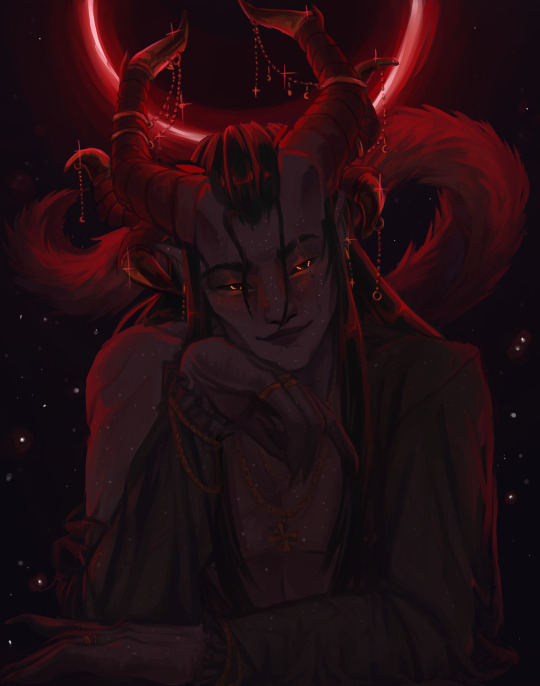
"I will not judge you for what you are. Just as I will not judge you for what you've fashioned yourself out to be. Or what you've lost in pursuit of that."
"Rest Easy. Your soft heart is safe in my grasp."
"I am born of cruelty but that isn't all I am"
#GOING ABSOLUTELY FERAL OVER THIS DAEMON#how dare he be so right about so many things-#he may be evil but he is honestly very ethically consistent and even in some ways admirable#he does things no one else will for the big picture#he's not nice but in that way he is kind#I could ramble about him all day and frankly I just might write an essay post on him analyzing his character he's so good#loving vega hours#redacted audio#redacted asmr#redactedverse#redacted vega#redacted demons#redacted carpe deus#vega#vega fanart#redacted fanart#redacted asmr fanart#redacted audio fanart#redacted vega fanart#illustration#digital painting
417 notes
·
View notes
Text
Minor spoilers for the already revealed chapters of the next A Starless Clan book Wind
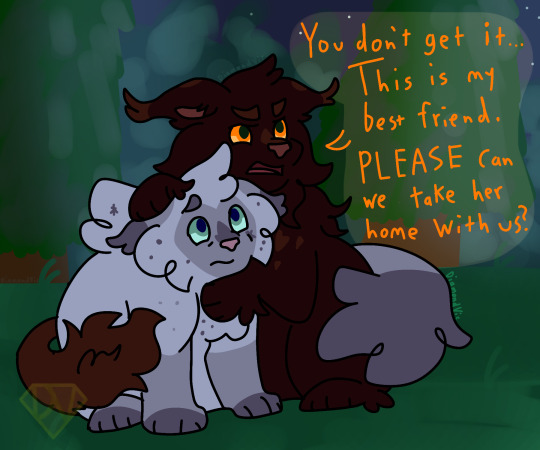
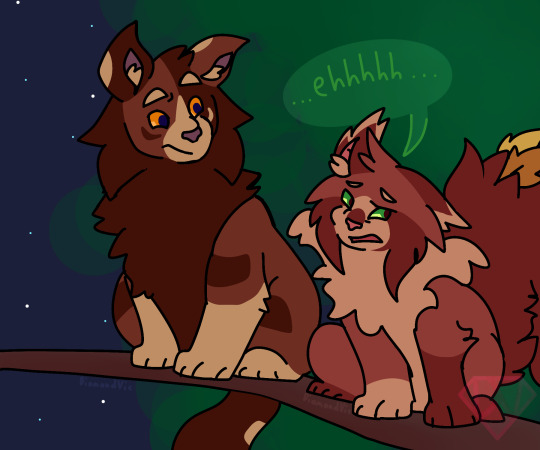
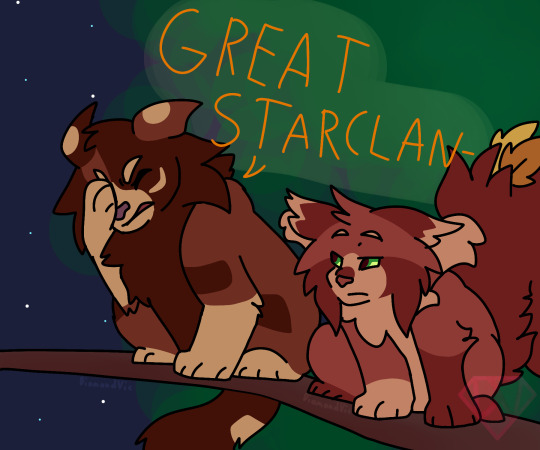
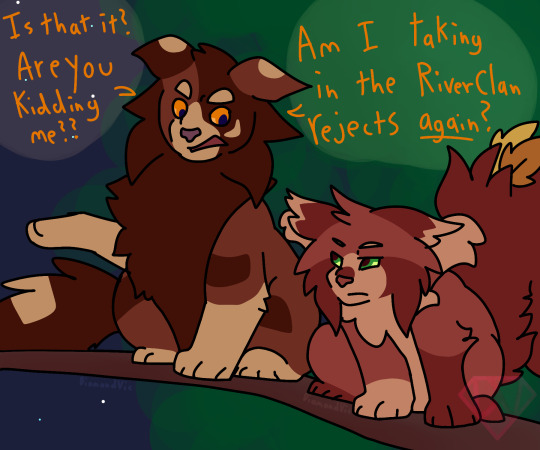
#a starless clan#a starless clan spoilers#wind spoilers#asc spoilers#warrior cats spoilers#warriors#warrior cats#tigerheart#tigerheartstar#tigerstar 2#tigerstar#Squirrelflight#squirrelstar#frostpaw#Nightheart#I’ve been wanting to draw this ever since the chapters were revealed and what better time than like two days til the book comes out#i actually think tigerheartstar is an interesting character in this arc he genuinely thinks he’s doing the right thing and he does honestly#want to help. he just does it by trying to crack dad jokes to lighten the mood while trying to run a group that doesn’t want him there#i also think it’s funny that he’s consistently just chill with taking in cats thrown out of their clans. ESPECIALLY from RiverClan#don’t get me wrong he’s super weird in omen of the stars and avos and I think in his super edition (I haven’t read it in a while)#but he’s also a good dad. he’s such a perplexing character I can’t help but find him interesting. at least he DOES stuff yknow#I’ll eat my words if he does turn out to be completely evil or something. but I’ll hate if he does his behavior really isn’t like Tigerstar#-the first. this guy isn’t out here trying to seize power#but ENOUGH ABOUT HIM!! Nightheart asking squirrelstar if frostpaw could come to thunderclan with him was so sweet#i wish she’d accepted I don’t want them to split up I’m worried the writers will forget the entire last book and they won’t be close again
205 notes
·
View notes
Note
aight. [slaps a love novel where PB once sat]
lets get these lovers back in talkin terms.
nyeheheh
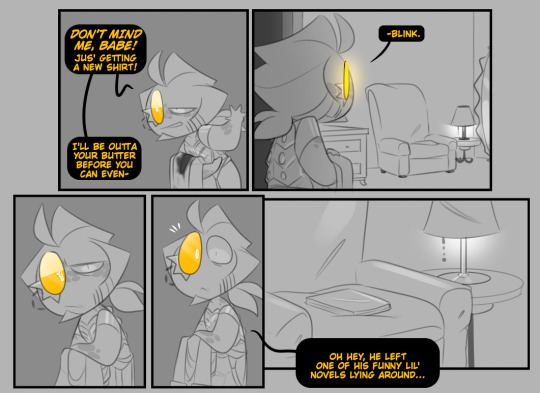
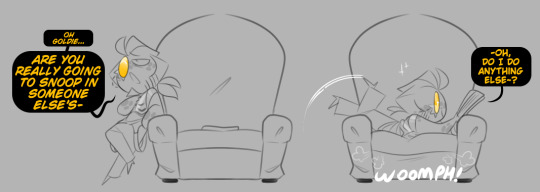


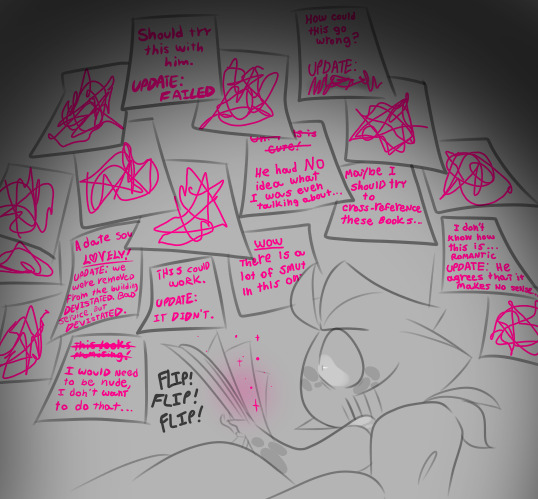
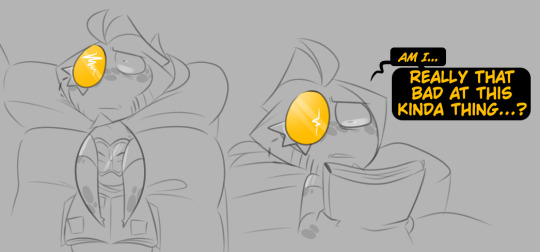



#Asks#Given that this is one of Gold's Ideas; this will go one of two ways. it's gonna go horribly wrong either on purpose or by accident/jk#He's just as good at this as PB. Probably worse cuz he doesn't even really do “research”#he's just going by the seat of his pants on what feels right to him.#don't ask how he managed this long in the relationship#not even he would be able to tell you-#at least honestly#cookie run kingdom#cookie run#crk#gold choco cookie#cookie run oc#cookie oc
272 notes
·
View notes
Text
Luke promising new solo music "soon" at iHeartRadio's ALTer EGO
#i cannot find the actual interview atm lmao but knew this was of immediate interest so will keep posted 🙃#5sos#5 seconds of summer#luke hemmings#luke#video#boy ep#alter ego 2024#kh4f post#honestly good on his team for finally being able to position him as an adult alternative artist#first the fest and now this#like obviously having a foot in the door at iheart helps but still seeing him on the alt98 socials is fascinating#and to me implies they are open to featuring him when the time is right#which theoretically could open doors for 5sos since they had started to naturally break into the adult alt scene with the 5sos5 singles#anyways i digress#✨ industry things ✨ like this fascinate me
105 notes
·
View notes
Text
I wasn't going to do any designs for when the robins were older yet but I was sleep deprived and just started sketching, so have a Red Hood.

Au belongs to @phoenixcatch7 and you need to check them out <3
#possessed doll au#batman au#batman#jason todd#art#sketch#red hood#I like to think that they all start having chest cavities for extra space lol#Or other such secret compartments#Jason likes to open his up like 'I got the goods' to show several snacks & weapons lmao#Honestly I think he has fun making the doll look slightly damaged without it actually being so#Still love the idea of part of the head being repaired with resin to make a skull visible underneath in the right lighting#Why yes things are on fire behind him but why would you think he was the one who did it#It definitely wasn't him but he needs some sort of intimidation that's not 6 heads in a duffel bag#Maybe he still does that too#I feel like there's some sort of consequences to the puppet body getting stolen even if it's just pieces they couldn't recover#There's definitely consequences to those pieces being dumped into a Lazarus Pit#Everyone freaks out because Jason just suddenly *collapses* like he's in a coma (like his mind has gotten thrown into a mostly broken body)#Hey they probably get Damian out of it tho
150 notes
·
View notes
Text
When Subaru is not shirtless on the new summer themed DL art
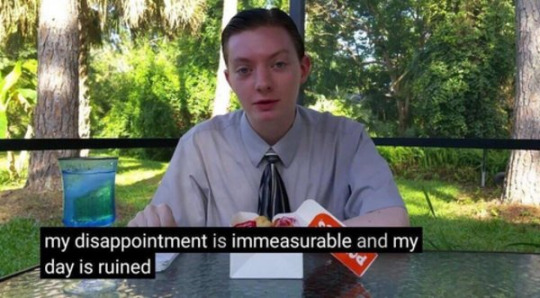
LIKE WHY DOES RUKI LOOK MORE MUSCULAR THAN SUBARU DOES???
I feel R O B B E D.
#like the art is really good and most of the boys look *chef's kiss*#Honestly Subaru doesn't even look bad either#but I'm disappointed they didn't show off his GAINS#when Ruki is there right behind him#looking like a gym rat
160 notes
·
View notes
Text
At the end of his quest line, Astarion repeats the words he said to Tav on the night they let him feed on them and the narrative poetry of that choice is exceptional.
#“This is a gift you know. I won’t forget it.”#those are the words#baldur’s gate 3#bg3#Astarion#spoilers-ish#his character arc is honestly exceptional I cannot believe I ever doubted Larian#the growth he exhibits while still staying true to the core of who he is astounds me#like#no other game could ever hope to get it this right#this is for the good ending btw#in no world would I convince him to do the ritual
245 notes
·
View notes
Text
congratulations to Mme. Pascale Leclerc, who has surely just experienced both the funniest and most unhinged weekend a mother could ever have. Dear fucking christ, I hope your middlest son brought you a bottle of champagne for yourself, ma'am.
#kazoo noises#charles leclerc#cl16#monaco gp 2024#zoomies posting#sports posting#like man. where to begin. one of your racecar children is back in town for the weekend. he has yet to have a truly good work#weekend it seems in town. now this year. we're feeling ourselves a bit. we're feeling optimistic even. and then ur son becomes talk of town#because he keeps doing fucking bits on twitter about adopting his coworker who is friends with your youngest son. this goes on long enough#for actual reporters to comment on it. no one is willing to blink first so by friday night we've yes-anded ourselves to a grandson#(congratulations mme leclerc)#things go well. and then at qualifying they go DAMN WELL#BETTER THAN EVER REALLY! but man. im superstitious. i dont trust shit until its over and the dust has cleared#(the adoption jokes have continued by the way) and MEANWHILE everyone is eyeing that starting grid. were humming. we're making vague hand#gestures when commenting. we're all thinking. Maybe? (the streets can hear u tho. keep it down)#race starts. lap one CHAOS. so many fucking crashes. i'd faint if i had a child even in karting honestly.#(every parent in this sport deserves a prescription for laudanum)#but he's not in it. hes at the front. and he. well. he just Stays There. Through It All. and the laps tick down. until the race is run. and#there he is. your middlest son. cross the line and into the books. first place. home town. what curse indeed. thats your boy!!!!!!!! THERE!#they play the radio of him winning and the audio is peaked because he screams out so loudly. you can hear the water in the laughter.#later theres gonna be videos and photos taken of him pushing his boss into the harbor and diving right in after the man. those photos are#gonna be fucking studied in photography classes one day. and STILL! everyone involved with that goofy joke about him adopting his coworker#(who. despite all the silliness of the race stayed second place and got a podium) is still carrying the bit like a baton relay. Do you have#him over for family dinner? might as well add a plate i guess! people are joking about your youngest son having two nephews? a dog born#maybe a month ago and a man born about... what twenty three years and about a month ago? fuck it! family dinner#sorry this bit got away from me but as someone who loves my homecity and my mom so much it might actually be like.#a visible growth inside my body if they do an autopsy on me at time of death or like. my love will eat me alive. sometimes the charratives#gets to me#anyway cheers mme leclerc i hope you party so fucking hard this week
40 notes
·
View notes
Text
Tell Your Dad You Love Him
A retelling of "Meat Loves Salt"/"Cap O'Rushes" for the @inklings-challenge Four Loves event
An old king had three daughters. When his health began to fail, he summoned them, and they came.
Gordonia and Rowan were already waiting in the hallway when Coriander arrived. They were leaned up against the wall opposite the king’s office with an air of affected casualness. “I wonder what the old war horse wants today?” Rowan was saying. “More about next year’s political appointments, I shouldn’t wonder.”
“The older he gets, the more he micromanages,” Gordonia groused fondly. “A thousand dollars says this meeting could’ve been an email.”
They filed in single-file like they’d so often done as children: Gordonia first, then Rowan, and Coriander last of all. The king had placed three chairs in front of his desk all in a row. His daughters murmured their greetings, and one by one they sat down.
“I have divided everything I have in three,” the king said. “I am old now, and it’s time. Today, I will pass my kingdom on to you, my daughters.”
A short gasp came from Gordonia. None of them could have imagined that their father would give up running his kingdom while he still lived.
The king went on. “I know you will deal wisely with that which I leave in your care. But before we begin, I have one request.”
“Yes father?” said Rowan.
“Tell me how much you love me.”
An awkward silence fell. Although there was no shortage of love between the king and his daughters, theirs was not a family which spoke of such things. They were rich and blue-blooded: a soldier and the daughters of a soldier, a king and his three court-reared princesses. The royal family had always shown their affection through double meanings and hot cups of coffee.
Gordonia recovered herself first. She leaned forward over the desk and clasped her father’s hands in her own. “Father,” she said, “I love you more than I can say.” A pause. “I don’t think there’s ever been a family so happy in love as we have been. You’re a good dad.”
The old king smiled and patted her hand. “Thank you, Gordonia. We have been very happy, haven’t we? Here is your inheritance. Cherish it, as I cherish you.”
Rowan spoke next; the words came tumbling out. “Father! There’s not a thing in my life which you didn’t give me, and all the joy in the world beside. Come now, Gordonia, there’s no need to understate the matter. I love you more than—why, more than life itself!”
The king laughed, and rose to embrace his second daughter. “How you delight me, Rowan. All of this will be yours.”
Only Coriander remained. As her sisters had spoken, she’d wrung her hands in her lap, unsure of what to say. Did her father really mean for flattery to be the price of her inheritance? That just wasn’t like him. For all that he was a politician, he’d been a soldier first. He liked it when people told the truth.
When the king’s eyes came to rest on her, Coriander raised her own to meet them. “Do you really want to hear what you already know?”
“I do.”
She searched for a metaphor that could carry the weight of her love without unnecessary adornment. At last she found one, and nodded, satisfied. “Dad, you’re like—like salt in my food.”
“Like salt?”
“Well—yes.”
The king’s broad shoulders seemed to droop. For a moment, Coriander almost took back her words. Her father was the strongest man in the world, even now, at eighty. She’d watched him argue with foreign rulers and wage wars all her life. Nothing could hurt him. Could he really be upset?
But no. Coriander held her father’s gaze. She had spoken true. What harm could be in that?
“I don’t know why you’re even here, Cor,” her father said.
Now, Coriander shifted slightly in her seat, unnerved. “What? Father—”
“It would be best if—you should go,” said the old king.
“Father, you can’t really mean–”
“Leave us, Coriander.”
So she left the king’s court that very hour.
.
It had been a long time since she’d gone anywhere without a chauffeur to drive her, but Coriander’s thoughts were flying apart too fast for her to be afraid. She didn’t know where she would go, but she would make do, and maybe someday her father would puzzle out her metaphor and call her home to him. Coriander had to hope for that, at least. The loss of her inheritance didn’t feel real yet, but her father—how could he not know that she loved him? She’d said it every day.
She’d played in the hall outside that same office as a child. She’d told him her secrets and her fears and sent him pictures on random Tuesdays when they were in different cities just because. She had watched him triumph in conference rooms and on the battlefield and she’d wanted so badly to be like him.
If her father doubted her love, then maybe he’d never noticed any of it. Maybe the love had been an unnoticed phantasm, a shadow, a song sung to a deaf man. Maybe all that love had been nothing at all.
A storm was on the horizon, and it reached her just as she made it onto the highway. Lightning flashed and thunder rolled. Rain poured down and flooded the road. Before long, Coriander was hydroplaning. Frantically, she tried to remember what you were supposed to do when that happened. Pump the brakes? She tried. No use. Wasn’t there something different you did if the car had antilock brakes? Or was that for snow? What else, what else–
With a sickening crunch, her car hit the guardrail. No matter. Coriander’s thoughts were all frenzied and distant. She climbed out of the car and just started walking.
Coriander wandered beneath an angry sky on the great white plains of her father’s kingdom. The rain beat down hard, and within seconds she was soaked to the skin. The storm buffeted her long hair around her head. It tangled together into long, matted cords that hung limp down her back. Mud soiled her fine dress and splattered onto her face and hands. There was water in her lungs and it hurt to breathe. Oh, let me die here, Coriander thought. There’s nothing left for me, nothing at all. She kept walking.
.
When she opened her eyes, Coriander found herself in a dank gray loft. She was lying on a strange feather mattress.
She remained there a while, looking up at the rafters and wondering where she could be. She thought and felt, as it seemed, through a heavy and impenetrable mist; she was aware only of hunger and weakness and a dreadful chill (though she was all wrapped in blankets). She knew that a long time must have passed since she was fully aware, though she had a confused memory of wandering beside the highway in a thunderstorm, slowly going mad because—because— oh, there’d been something terrible in her dreams. Her father, shoulders drooping at his desk, and her sisters happily come into their inheritance, and she cast into exile—
She shuddered and sat up dizzily. “Oh, mercy,” she murmured. She hadn’t been dreaming.
She stumbled out of the loft down a narrow flight of stairs and came into a strange little room with a single window and a few shabby chairs. Still clinging to the rail, she heard a ruckus from nearby and then footsteps. A plump woman came running to her from the kitchen, wiping her hands on her apron and softly clucking at the state of her guest’s matted, tangled hair.
“Dear, dear,” said the woman. “Here’s my hand, if you’re still unsteady. That’s good, good. Don’t be afraid, child. I’m Katherine, and my husband is Folke. He found you collapsed by the goose-pond night before last. I’m she who dressed you—your fine gown was ruined, I’m afraid. Would you like some breakfast? There’s coffee on the counter, and we’ll have porridge in a minute if you’re patient.”
“Thank you,” Coriander rasped.
“Will you tell me your name, my dear?”
“I have no name. There’s nothing to tell.”
Katherine clicked her tongue. “That’s alright, no need to worry. Folke and I’ve been calling you Rush on account of your poor hair. I don’t know if you’ve seen yourself, but it looks a lot like river rushes. No, don’t get up. Here’s your breakfast, dear.”
There was indeed porridge, as Katherine had promised, served with cream and berries from the garden. Coriander ate hungrily and tasted very little. Then, when she was finished, the goodwife ushered her over to a sofa by the window and put a pillow beneath her head. Coriander thanked her, and promptly fell asleep.
.
She woke again around noon, with the pounding in her head much subsided. She woke feeling herself again, to visions of her father inches away and the sound of his voice cracking across her name.
Katherine was outside in the garden; Coriander could see her through the clouded window above her. She rose and, upon finding herself still in a borrowed nightgown, wrapped herself in a blanket to venture outside.
“Feeling better?” Katherine was kneeling in a patch of lavender, but she half rose when she heard the cottage door open.
“Much. Thank you, ma’am.
“No thanks necessary. Folke and I are ministers, of a kind. We keep this cottage for lost and wandering souls. You’re free to remain here with us for as long as you need.”
“Oh,” was all Coriander could think to say.
“You’ve been through a tempest, haven’t you? Are you well enough to tell me where you came from?”
Coriander shifted uncomfortably. “I’m from nowhere,” she said. “I have nothing.”
“You don’t owe me your story, child. I should like to hear it, but it will keep till you’re ready. Now, why don’t you put on some proper clothes and come help me with this weeding.”
.
Coriander remained at the cottage with Katherine and her husband Folke for a week, then a fortnight. She slept in the loft and rose with the sun to help Folke herd the geese to the pond. After, Coriander would return and see what needed doing around the cottage. She liked helping Katherine in the garden.
The grass turned gold and the geese’s thick winter down began to come in. Coriander’s river-rush hair proved itself unsalvageable. She spent hours trying to untangle it, first with a hairbrush, then with a fine-tooth comb and a bottle of conditioner, and eventually even with honey and olive oil (a home remedy that Folke said his mother used to use). So, at last, Coriander surrendered to the inevitable and gave Katherine permission to cut it off. One night, by the yellow light of the bare bulb that hung over the kitchen table, Katherine draped a towel over Coriander’s shoulders and tufts of gold went falling to the floor all round her.
“I’m here because I failed at love,” she managed to tell the couple at last, when her sorrows began to feel more distant. “I loved my father, and he knew it not.”
Folke and Katherine still called her Rush. She didn’t correct them. Coriander was the name her parents gave her. It was the name her father had called her when she was six and racing down the stairs to meet him when he came home from Europe, and at ten when she showed him the new song she’d learned to play on the harp. She’d been Cor when she brought her first boyfriend home and Cori the first time she shadowed him at court. Coriander, Coriander, when she came home from college the first time and he’d hugged her with bruising strength. Her strong, powerful father.
As she seasoned a pot of soup for supper, she wondered if he understood yet what she’d meant when she called him salt in her food.
.
Coriander had been living with Katherine and Folke for two years, and it was a morning just like any other. She was in the kitchen brewing a pot of coffee when Folke tossed the newspaper on the table and started rummaging in the fridge for his orange juice. “Looks like the old king’s sick again,” he commented casually. Coriander froze.
She raced to the table and seized hold of the paper. There, above the fold, big black letters said, KING ADMITTED TO HOSPITAL FOR EMERGENCY TREATMENT. There was a picture of her father, looking older than she’d ever seen him. Her knees went wobbly and then suddenly the room was sideways.
Strong arms caught her and hauled her upright. “What’s wrong, Rush?”
“What if he dies,” she choked out. “What if he dies and I never got to tell him?”
She looked up into Folke’s puzzled face, and then the whole sorry story came tumbling out.
When she was through, Katherine (who had come downstairs sometime between salt and the storm) took hold of her hand and kissed it. “Bless you, dear,” she said. “I never would have guessed. Maybe it’s best that you’ve both had some time to think things over.”
Katherine shook her head. “But don’t you think…?”
“Yes?”
“Well, don’t you think he should have known that I loved him? I shouldn’t have needed to say it. He’s my father. He’s the king.”
Katherine replied briskly, as though the answer should have been obvious. “He’s only human, child, for all that he might wear a crown; he’s not omniscient. Why didn’t you tell your father what he wanted to hear?”
“I didn’t want to flatter him,” said Coriander. “That was all. I wanted to be right in what I said.”
The goodwife clucked softly. “Oh dear. Don’t you know that sometimes, it’s more important to be kind than to be right?”
.
In her leave-taking, Coriander tried to tell Katherine and Folke how grateful she was to them, but they wouldn’t let her. They bought her a bus ticket and sent her on her way towards King’s City with plenty of provisions. Two days later, Coriander stood on the back steps of one of the palace outbuildings with her little carpetbag clutched in her hands.
Stuffing down the fear of being recognized, Coriander squared her shoulders and hoped they looked as strong as her father’s. She rapped on the door, and presently a maid came and opened it. The maid glanced Coriander up and down, but after a moment it was clear that her disguise held. With all her long hair shorn off, she must have looked like any other girl come in off the street.
“I’m here about a job,” said Coriander. “My name’s Rush.”
.
The king's chambers were half-lit when Coriander brought him his supper, dressed in her servants’ apparel. He grunted when she knocked and gestured with a cane towards his bedside table. His hair was snow-white and he was sitting in bed with his work spread across a lap-desk. His motions were very slow.
Coriander wanted to cry, seeing her father like that. Yet somehow, she managed to school her face. Like he would, she kept telling herself. Stoically, she put down the supper tray, then stepped back out into the hallway.
It was several minutes more before the king was ready to eat. Coriander heard papers being shuffled, probably filed in those same manilla folders her father had always used. In the hall, Coriander felt the seconds lengthen. She steeled herself for the moment she knew was coming, when the king would call out in irritation, “Girl! What's the matter with my food? Why hasn’t it got any taste?”
When that moment came, all would be made right. Coriander would go into the room and taste his food. “Why,” she would say, with a look of complete innocence, “It seems the kitchen forgot to salt it!” She imagined how her father’s face would change when he finally understood. My daughter always loved me, he would say.
Soon, soon. It would happen soon. Any second now.
The moment never came. Instead, the floor creaked, followed by the rough sound of a cane striking the floor. The door opened, and then the king was there, his mighty shoulders shaking. “Coriander,” he whispered.
“Dad. You know me?”
“Of course.”
“Then you understand now?”
The king’s wrinkled brow knit. “Understand about the salt? Of course, I do. It wasn't such a clever riddle. There was surely no need to ruin my supper with a demonstration.”
Coriander gaped at him. She'd expected questions, explanations, maybe apologies for sending her away. She'd never imagined this.
She wanted very badly to seize her father and demand answers, but then she looked, really looked, at the way he was leaning on his cane. The king was barely upright; his white head was bent low. Her questions would hold until she'd helped her father back into his room.
“If you knew what I meant–by saying you were like salt in my food– then why did you tell me to go?” she asked once they were situated back in the royal quarters.
Idly, the king picked at his unseasoned food. “I shouldn’t have done that. Forgive me, Coriander. My anger and hurt got the better of me, and it has brought me much grief. I never expected you to stay away for so long.”
Coriander nodded slowly. Her father's words had always carried such fierce authority. She'd never thought to question if he really meant what he’d said to her.
“As for the salt,” continued the king, "Is it so wrong that an old man should want to hear his daughters say ‘I love you' before he dies?”
Coriander rolled the words around in her head, trying to make sense of them. Then, with a sudden mewling sound from her throat, she managed to say, “That's really all you wanted?”
“That's all. I am old, Cor, and we've spoken too little of love in our house.” He took another bite of his unsalted supper. His hand shook. “That was my failing, I suppose. Perhaps if I’d said it, you girls would have thought to say it back.”
“But father!” gasped Coriander, “That’s not right. We've always known we loved one another! We've shown it a thousand ways. Why, I've spent the last year cataloging them in my head, and I've still not even scratched the surface!”
The king sighed. “Perhaps you will understand when your time comes. I knew, and yet I didn't. What can you really call a thing you’ve never named? How do you know it exists? Perhaps all the love I thought I knew was only a figment.”
“But that’s what I’ve been afraid of all this time,” Coriander bit back. “How could you doubt? If it was real at all– how could you doubt?”
The king’s weathered face grew still. His eyes fell shut and he squeezed them. “Death is close to me, child. A small measure of reassurance is not so very much to ask.”
.
Coriander slept in her old rooms that night. None of it had changed. When she woke the next morning, for a moment she remembered nothing of the last two years.
She breakfasted in the garden with her father, who came down the steps in a chair-lift. “Coriander,” he murmured. “I half-thought I dreamed you last night.”
“I’m here, Dad,” she replied. “I’m not going anywhere.”
Slowly, the king reached out with one withered hand and caressed Coriander's cheek. Then, his fingers drifted up to what remained of her hair. He ruffled it, then gently tugged on a tuft the way he'd used to playfully tug her long braid when she was a girl.
“I love you,” he said.
“That was always an I love you, wasn’t it?” replied Coriander. “My hair.”
The king nodded. “Yes, I think it was.”
So Coriander reached out and gently tugged the white hairs of his beard. “You too,” she whispered.
.
“Why salt?” The king was sitting by the fire in his rooms wrapped in two blankets. Coriander was with him, enduring the sweltering heat of the room without complaint.
She frowned. “You like honesty. We have that in common. I was trying to be honest–accurate–to avoid false flattery.”
The king tugged at the outer blanket, saying nothing. His lips thinned and his eyes dropped to his lap. Coriander wished they wouldn’t. She wished they would hold to hers, steely and ready for combat as they always used to be.
“Would it really have been false?” the king said at last. “Was there no other honest way to say it? Only salt?”
Coriander wanted to deny it, to give speech to the depth and breadth of her love, but once again words failed her. “It was my fault,” she said. “I didn’t know how to heave my heart into my throat.” She still didn’t, for all she wanted to.
.
When the doctor left, the king was almost too tired to talk. His words came slowly, slurred at the edges and disconnected, like drops of water from a leaky faucet.
Still, Coriander could tell that he had something to say. She waited patiently as his lips and tongue struggled to form the words. “Love you… so… much… You… and… your sisters… Don’t… worry… if you… can’t…say…how…much. I… know.”
It was all effort. The king sat back when he was finished. Something was still spasming in his throat, and Coriander wanted to cry.
“I’m glad you know,” she said. “I’m glad. But I still want to tell you.”
Love was effort. If her father wanted words, she would give him words. True words. Kind words. She would try…
“I love you like salt in my food. You're desperately important to me, and you've always been there, and I don't know what I'll do without you. I don’t want to lose you. And I love you like the soil in a garden. Like rain in the spring. Like a hero. You have the strongest shoulders of anyone I know, and all I ever wanted was to be like you…”
A warm smile spread across the old king’s face. His eyes drifted shut.
#inklingschallenge#theme: storge#story: complete#inklings challenge#leah stories#OKAY. SO#i spend so much time thinking about king lear. i think i've said before that it's my favorite shakespeare play. it is not close#and one of the hills i will die on is that cordelia was not in the right when she refused to flatter her dad#like. obviously he's definitely not in the right either. the love test was a screwed up way to make sure his kids loved him#he shouldn't have tied their inheritances into it. he DEFINITELY shouldn't have kicked cordelia out when she refused to play#but like. Cordelia. there is no good reason not to tell your elderly dad how much you love him#and okay obviously lear is my starting point but the same applies to the meat loves salt princess#your dad wants you to tell him you love him. there is no good reason to turn it into a riddle. you had other options#and honestly it kinda bothers me when people read cordelia/the princess as though she's perfectly virtuous#she's very human and definitely beats out the cruel sisters but she's definitely not aspirational. she's not to be emulated#at the end of the day both the fairytale and the play are about failures in storge#at happens when it's there and you can't tell. when it's not and you think it is. when you think you know someone's heart and you just don'#hey! that's a thing that happens all the time between parents and children. especially loving past each other and speaking different langua#so the challenge i set myself with this story was: can i retell the fairytale in such a way that the princess is unambiguously in the wrong#and in service of that the king has to get softened so his errors don't overshadow hers#anyway. thank you for coming to my TED talk#i've been thinking about this story since the challenge was announced but i wrote the whole thing last night after the super bowl#got it in under the wire! yay!#also! the whole 'modern setting that conflicts with the fairytale language' is supposed to be in the style of modern shakespeare adaptation#no idea if it worked but i had a lot of fun with it#pontifications and creations
68 notes
·
View notes
Conversation
Dazai: If you water water, it grows.
Mozart: ...What.
Isaac: He's got a point.
#ikevamp#ikemen vampire#ikevamp incorrect quotes#ikevamp dazai#ikevamp mozart#ikevamp isaac#honestly i can easily imagine sometimes dazai says something that's technically right#and isaac hates having to agree but on principle he can't disagree#which leaves him in that painful no-man's-land of begrudging concurrence#isaac's literally the 'I GUESS' meme every day of his life#are you proud of yourself dazai#you gave a perfectly good scientist a hernia#source: incorrect quote generator
242 notes
·
View notes
Text
Arajin observation notes so far:
- good reflexes? (dodging the trip in ep1)
- strong enough to hold up Matakara??
- is the punches to Matakara's kicks :3c
Kid was definitely serious about becoming strong back then 😂
#bucchigiri?!#watch and yell#spoilers#honestly i think arajin is still very strong on his own#but he's likely hampered by fear and his sense of guilt#also might tie in with the best friend stone and how he feels like he doesnt deserve it?? he probs still has it tho#i am SEEING the VISION#everybody loves Arajin except the one person who he wants to love him back LMAO#ALSO THE VERY END OF THE ENDING SONG??#WILL EVERYONE GET TO DO THE HEART POSE???#this feels so old school in such a good way i love it SO MUCH#also i am glad i was right that WAS matakara's brother#now why is he in jail(?) is the real question#running theory that arajin feels responsible for it#maybe big bro was protecting lil bro when arajin ran off and it got serious#something like that?#i am thinking way too hard about this#but I NEED TO KNOW
51 notes
·
View notes
Text
rtd's finales are badly stacked conflicts that are suddenly solved by deus ex machina (but that doesn't matter bc it's filled with genuinely beautiful & heartwrenching character writing that will make you forget about everything) and moffat's finales are convoluted nonsense that make you confused as to what the fuck you're even watching. technically neither of these are good but between these two poisons i will pick the former every time
#disclaimer im biased and you should all take my media criticism with a grain of salt#bc i genuinely do not care how well constructed a thing is if the character writing is good enough.#like that's all im there for. my senses are honestly kind of primed to enjoy rtd's style over anyone else's#dr who#the real question i ask myself is 'will moffat get better at writing finales in twelve's run'#and the answer i have for myself right now is 'hopefully it does in s10 bc i want it to be good'#but i am so absolutely not sure of this.#bc i can definitively say that inside man (2022) by moffat is like. by far the worst thing of his ive ever seen#so i cant use the 'he probably got better with time' reassurance. i think something is wrong with him#misc
54 notes
·
View notes
Text
I think it's reached the status of pet peeve for me at this point, how common it is in the fandom for people to assume that adoption into the Jiang family was a unilateral good, that Wei Wuxian definitely wanted and which was withheld from him, thereby proving he was not valued enough by his sect and teacher.
Partly just because that's boring, and leads to boring interpretations of the characters, personal opinion.
Partly because it often tends to reflect an uncritical absorption of the in-universe classist belief that being the son of Wei Changze was inherently valueless, and not worth keeping for its own sake.
And maybe especially because I'm starting to feel like it arises from an overall really flat perception of adoption as an institution, that American fans of a Chinese piece of fiction should maybe subject to more scrutiny.
#hoc est meum#mdzs#meta#griping#the overseas adoption industry#taking a kid in and showering him in material resources and opportunities is Good#adopting him offers security#but it also takes away his freedom and prior identity#giving up your family name isn't a small matter!#so in some ways adoption is actually a really fucked up thing to do in this scenario! given the impossibility of free consent#from a situation of total dependency#one of the costs jgy paid for his name#was calling a woman who hated him Mother and owing her every filial duty#i honestly think wwx would not have chosen to pay that cost#without some larger impetus than access to jiang family rights and privileges#disclaimer interesting things can definitely be done *with* the idea of wwx wanting adoption etc#but most of them are harder to achieve in the context of assuming this was both unmitigatedly true and obvious to everybody
33 notes
·
View notes
Text
Will Wood vanishes from the public light and returns two years later having produced a full-length Willard rock opera.
#dumb thought i had#honestly id be down#ANYWAY im really gonna miss him.#friends took me to his shows right before the pandemic and his music got me through a lot of awful shit#im probably gonna have In Case I Die on loop godamn i hope it makes me cry i could use a good sobbing#will wood#music
401 notes
·
View notes